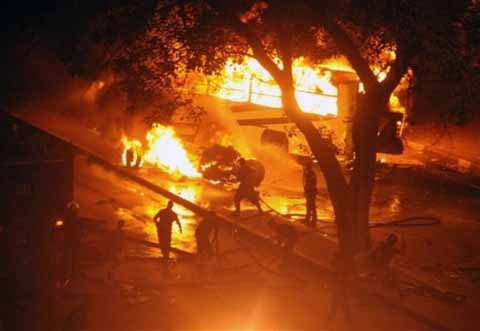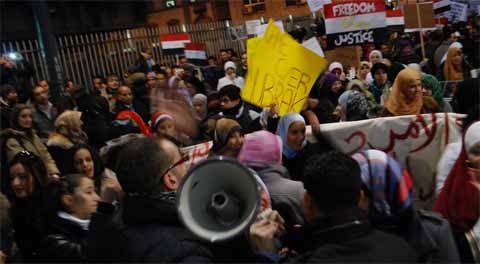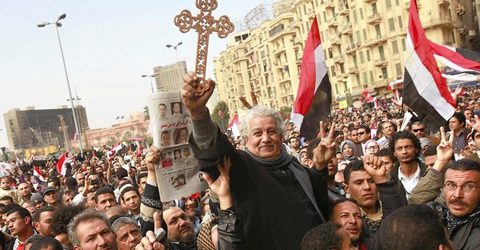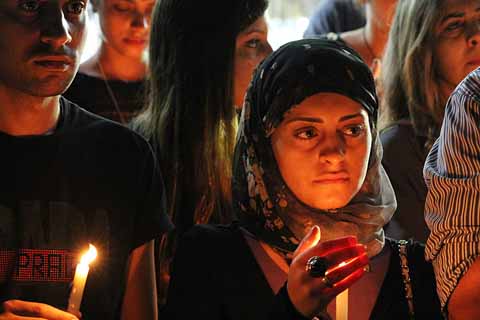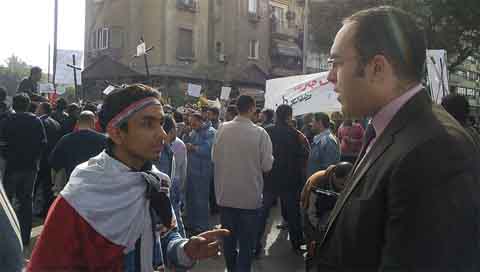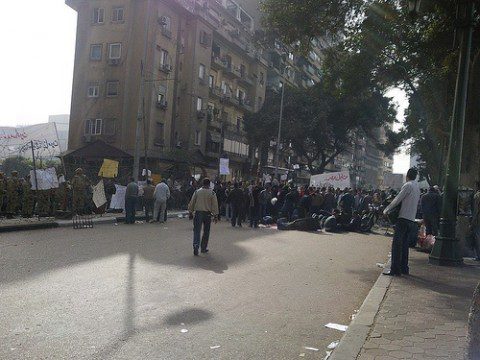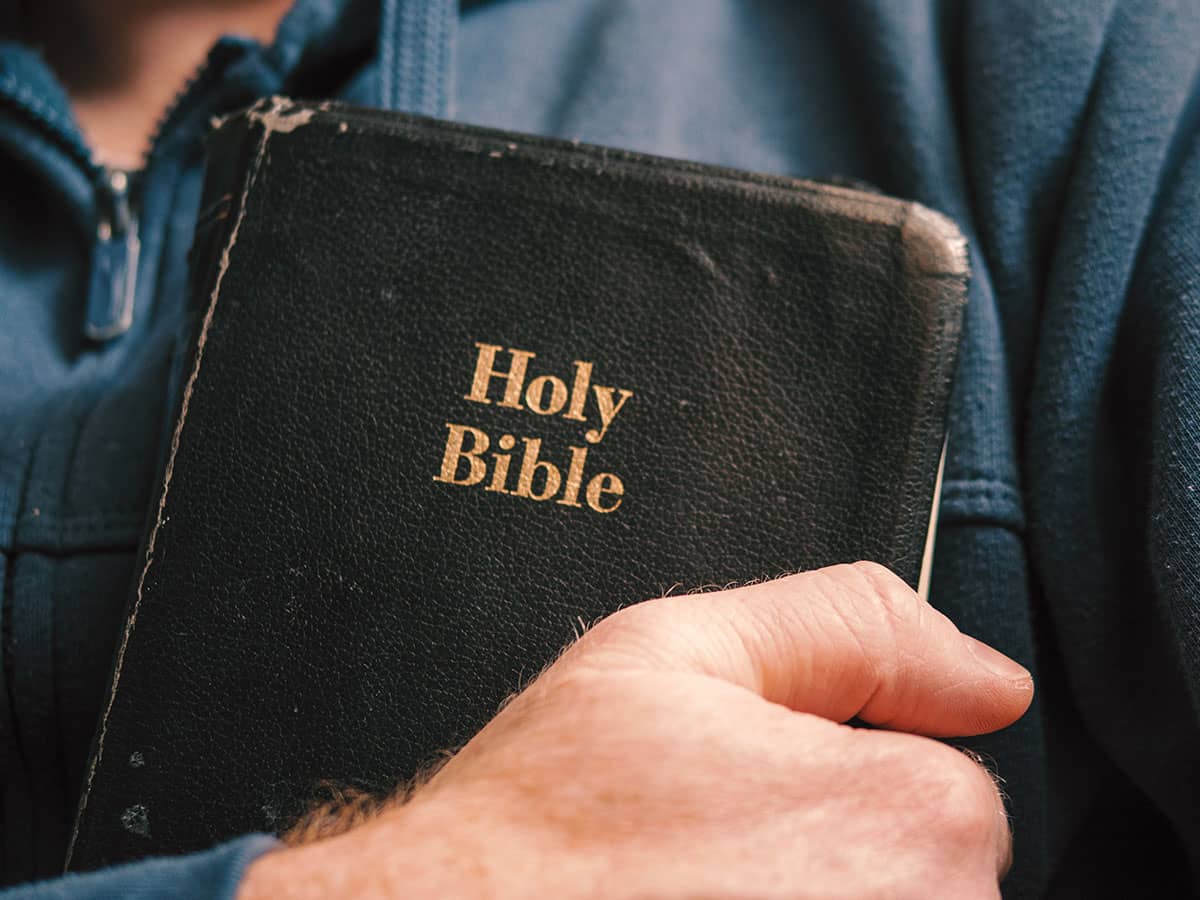Burned-out rubble is all that’s left of Christian shopkeeper Abskharon Suleiman’s appliance store in the northern Egyptian village of Sharbat. His home was destroyed as well as shops owned by his adult children – all targeted because they are Christians.
Christians pray for an end to the violence (Photo by Gorkems)
Ten-year-old Romany Rashed remembers being terrified during the attack. The fourth grader told the Christian Science Monitor ’s Kristen Chick of fleeing to a room “where his family huddled together, afraid for their lives, as a violent mob attacked their house.
“His family had fled to this room on the top floor, where pictures of Jesus and Coptic saints hang on bare cement walls. His parents dragged heavy furniture to the door, barricading it as they heard people try to break in below. The mob was throwing rocks at the windows, and he heard gunfire, says Romany. They were cursing Christians."
“We kept praying that God would be with us,” the boy told the Monitor reporter. “And He was.”
As the mob set fire to the home of a Christian family across the street, Muslim neighbors saved Romany’s family, hustling them out of their house by a back entrance, into a car, and out of the village, until it was safe enough to return.
After his church was burned to the ground in a village nearby, a local clergyman was sentenced to six months in prison for rebuilding the church slightly taller than the building permit allowed. Incredibly, as he appeals the verdict, no legal action has been taken against those who burned he church or the Muslim imams who inflamed their passions at local mosques, inciting a mob of 3,000 to burn down the church building.
In the southern Egyptian town of Qena, Dr. Alfy Adly, an obstetrician who is a Christian, describes a mob that attacked a Christian landlord
and another that drove out the elected governor of the area, who was also a Christian. Dr. Adly has videotape of a neighbor’s threats to kill him, but says police refuse to take any action.
Another mob attacked a church in the Nile delta village of Meet Bahsar, destroying the pastor’s car after rumors spread that a 14-year-old girl had been kidnapped by Christians and was being held in the church. The rumors were disproven, but no charges have been made by police for the car burning.
Are Christians in Egypt being targeted? Yes, says the Egyptian Initiative for Personal Rights, a secular activist group that is tracking attacks on Egypt’s religious minorities..
Most Egyptian Christians are Copts, who consider themselves to be the original Egyptians before the Arab conquest in 641 A.D. The Copts trace their Christian faith back to Mary, Joseph and the infant Jesus’ escape to Egypt when King Herod ordered all the male babies around Bethlehem murdered.
As recently as 1952, Copts prospered in Egyptian society – holding more than 50 percent of the wealth. But many lost everything when Gamal Abdel Nasser overthrew King Farouk and nationalized businesses nationwide. In addition, Nasser’s strong pro-Islamic policies further undermined the Copts’ standing. As a result, many Copts left for Australia, North America and Europe.
Those who remain say conditions have gotten steadily worse – and have taken a deadly turn with Muslim hardliners seizing control in the Arab Spring revolution that ousted longtime president Hosni Mubarak. In 1992, there were over 9 million Copts (out of a population of some 57 million Egyptians). Now, thousands have fled in the face of growing tensions and sporadic violence.
They say discrimination against Egyptian Christians is systematic, part of the hardline Islamic practice of dhimmitude, the toleration of non-Muslims while denying them basic human rights. Under shari’ah or Islamic law, non-Muslims suffer many legal inequities intended to motivate them to convert to Islam. In Pakistan and Egypt, this has included forcing Christians to take the worst jobs – such as collecting Cairo’s garbage, repairing sewers and scavenging in trash dumps, professions shunned by Muslims.
In October, thousands of Egyptian Copts demanding equality marched in Cairo – citing their participation in the Arab Spring demonstrations that resulted in the successful revolution that overthrew Hosni Mubarak. However, instead of being recognized and rewarded, the Copts saw their massive demonstration end in a bloodbath. The Egyptian army opened fire and ran protesters over with armored vehicles, leaving at least 27 dead.
Military officials have shrugged off the massacre, saying a “third-
party” was responsible for the killings – although no such culprit has been identified and video shows army vehicles plowing into the crowd.
Marching in protest (Photo by Bilo Brown)
But now, Egypt’s influential Maspero Youth Union – a Coptic Christian youth organization – has announced its plans to resume protests, particularly to draw attention to recent court rulings that have jailed Christians for such crimes as repairing church buildings.
It is not only illegal to build new churches in Egypt, but even to repair courtyard walls or gates keeping vandals out. So, it was extraordinary that in the village of el-Marenab, Coptic priest Makarious Boulos’ congregation was given a permit to rebuild their church after it was torched by a mob. But then he was jailed. The youth union told the Egyptian independent news agency Bikyamasr that their first protest will be at the general prosecutor’s office in the Supreme Court building to demand that Boulos be freed.
The priest was fined and given a six-month prison sentence on charges the newly reconstructed building was too tall. The Maspero Youth Union notes there are no such restrictions on mosque construction or repairs – and says this double-standard must end as Egypt embraces democracy. They say the double standard was glaring as Bolous was sent to jail while none of the leaders of the mob that burned down the church has even been arrested.
Local officials said the newly constructed church was 2.5 meters taller than what they had approved in the architectural drawings. After the violation was denounced from mosque pulpits, a mob of 3,000 burned the new building to the ground, then razed four nearby homes and two businesses, all Christian-owned.
“I feel it is unjust,” Bolous has said. “It’s not fair,” noting that a significant percentage of construction projects in Egypt are done without permits. Even when permits are issued, adherence to their stipulations is casual and enforcement is lax. The village where the church building once stood is surrounded by homes that have two or three extra floors built outside of permitted specifications and by others that were built with no permit at all, noted the Christian advocacy group Compass Direct News. “The whole village is full of people who are building against their licenses,” Bolous told the court. “So the whole thing is, ‘Why did they only cite the church and pick on the extra bit of building?’”
Bolous’ attorney, Osama Refaat, pointed out to the court that by law, it is contractors, not property owners, who are responsible for permit violations.
“Imams in more than 20 mosques called for crowds to gather and destroy the church and demolish the houses of the Copts and loot their properties,” reported Michael Ramzy, a villager from El Marenab.
That came after Muslim villagers had begun blockading the entrance to the church building and threatening Copts on the street – in effect making them hostages in their own homes. Their complaint? Crosses were visible from outside the church. A meeting was held with military leaders and village elders in which the local leadership of the church agreed to remove all crosses and bells outside the building.
“Peace returned briefly to the village, but by early the next week, the Muslim villagers abandoned the agreement and went back to harassing local Christians,” reported Compass. “They demanded the
removal of domes newly constructed on top of the church building, and the hard-line Muslims called for it to be burned.”
Christians march in the streets
The governor of Aswan, Mostafa al-Sayyed, has sided with the rioters. He blames the attacks on the Copts, saying they had provoked the violence by offending Muslim sensibilities – displaying crosses and building the domes too high — and that he had not approved the building permit. But documents produced by church officials and independently verified by the Egyptian Initiative for Personal Rights, showed that al-Sayyed signed off on the construction permits.
After the building was destroyed, the Egyptian government announced that it would fund and build a new church structure to replace the old one. However, those funds have not been forthcoming.
“It’s been six months now,” said Bolous, and even after officials “gave the permission to rebuild the church, I cannot go back to the church or hold any prayers there or even go to the village at all,”
Bolous said that al-Sayyed instead has blocked all attempts to build the replacement. “He keeps saying, ‘Tomorrow, the day after tomorrow, the day after – we are going to do it,’ but it never happens.”
The villagers who burned down the church building and have escaped criminal prosecution, Bolous said, are the same ones blocking the construction of a replacement. Because he can’t go back to the village, approximately 40 Coptic families in El Marenab are without a priest and cannot conduct church services.
Coptic leaders accuse the Egyptian government of playing a colluding role in the violence by not enforcing the law, which requires imprisonment as a penalty for acts of sectarian strife, “thuggery” and vandalism of private property. They ask why the only person jailed has been the Coptic clergyman.
His sentencing came less than two weeks after another Christian was jailed for six years on charges of “showing contempt of religion” and “insulting the Prophet Mohamed.” The court, in the southern Egyptian province of Assiut, said that Makram Diab, a school employee, had made offensive remarks against Islam’s prophet.
Christian activists told the Bikyamasr new agency that Diab’s sentencing was an “attempt to create divisions” between Muslims and Christians in the country. Noha el-Hennawy, a political studies student at Cairo University and activist who regularly participates in demonstrations for Coptic rights, said the government is “continuing the policy of Mubarak by jailing and even putting these people in front of a court. It is unacceptable for a country where we hoped for free speech.”
Copts point out the growing numbers of incidents such as the burning of Abskharon Suleiman’s appliance store in Sharbat, the destruction of his home and then of the shops owned by his adult children.
In that case, the Suleiman family was not even the target of a mob that had been inflamed by rumors of adultery between a Coptic Christian man and Muslim woman – each of them married to someone else, Muslim merchant Magdy Abu Sheashaa told National Public Radio.
Sheashaa told NPR that the Christian man had suggestive photos of the woman on his phone. Sheashaa admitted not actually having seen the pictures. However, the rumor was enough to send a frenzied mob
to the alleged offender’s house near the Suleiman family’s property.
Christian Copts hold a vigil for the dead
Sheashaa said that one of Suleiman’s adult sons fired a handgun into the air to try to disperse the mob, which then shouted insults at the Coptic family and demanded they leave the village where they had lived for two decades.
“They threw rocks through the windows and set our building on fire. I was sure we were going to die,” recalled Um Suleiman, the elderly wife of the merchant.
“The violence in Sharbat began as many sectarian conflicts in Egypt do – with rumors of an affair between a Christian man and a Muslim woman. It ended with eight Christian families forced to leave the village, their property and belongings left to be sold on their behalf by a local committee. The punishment for those who looted and burned Christian properties? None.”
That decision as well as the selling of the Christians’ property at auction was the outcome of a “reconciliation meeting,” in which the fate of the accused is determined by locals rather than the law. The Copts say such sessions always favor the Muslims – with the Christians losing everything with no recourse.
“Mubarak may have been ousted a year ago, but methods haven’t changed,” reported the Monitor. “Members of Egypt’s new Islamist-dominated parliament sat in on some of the Sharbat meetings, effectively sanctioning the use of extrajudicial means.
Ishak Ibrahim, a researcher for the Egyptian Initiative for Personal Rights who wrote a report on the incident, says rule of law is the only solution – not local cronyism.
“If Islamic parties, and all parties, insisted on applying the law, and don’t accept the results of these reconciliation meetings – if we do that, I think it may have a positive effect on sectarian incidents,” he says. “Because one would know if he torched or destroyed houses or shops of Christians, he will go to court and be charged.”
He says the “reconciliation” meetings were illegal, because the law demands a criminal investigation into arson. Those who sponsored the agreement, he says, “flagrantly violated the law.”
Furthermore, refusing to stand up for justice for Christian victims in Sharbat, he said, could have dangerous implications for future religious strife in Egypt.
Samir Rashad, Romany’s father, says the recent violence in Sharbat was not the first case of tension between Christians and what he calls radical Muslims there. But it was the worst. At least three Christian homes were completely destroyed after crowds lit them on fire, and at least 10 shops owned by Christians were looted, including the Suleiman family stores and Rashad’s tailoring shop. Some were burned.
Rashad says there are many honorable Muslims in the village and some intervened to save Christian families like his. But he blamed the violence on radicals. “This was just an excuse for them to generalize everything against Christians and say we want to get them out of the village,” he says. “Those radical Muslims have been meaning to do something like that. They were looking for a reason to attack the Christians.”
Witnesses say police officers watched the attacks and did nothing. Instead, Muslim neighbors and friends intervened. They formed a protective cordon around the Christians and brought them to their own homes. Sheashaa took in the Suleiman family.
Sheashaa says a group of Muslim elders later came to express their sympathy that the Suleiman homes and shops had been destroyed, but they urged the Christian family to move out of town – that they felt it was no longer safe for Suleiman and his family to stay in Sharbat.
They stayed with Sheashaa for a few days, then moved into a cramped apartment an hour’s drive away. Suleiman’s eldest son told NPR they
want to go back home, but are afraid of being attacked again – even though a committee sent by the Egyptian parliament has decreed the family has the right to live in Sharbat.
Ihab Ramzy, a Coptic Christian lawmaker who was a member of the committee, says he understands the family’s fears.
“Is there an extremist wave that is identifying Christians and trying to drive them out of Egypt? Personally, I doubt it, but you know, maybe I’m naive,” says Mahmoud Sabit, an Egyptian historian living in Cairo.
Marching for equal rights (Photo by Photos of Daily Life)
He told NPR that Copts get nervous when Islamist candidates talk about incorporating more Islamic law into Egyptian society. “So this I think is one of their great fears, is a reversal and suddenly finding themselves as second-class citizens,” he said.
Last December on a talk show on Egyptian TV, a Christian caller who gave her name as Mervat accused the guest — an ultra-conservative Muslim — of trying to drive Christians out of Egypt.
The Coptic Christian caller accused Hazem Salah Abu Ismail — who is a presidential candidate — of inciting hatred and violence by demanding Christian women wear veils. She said that if Christians don’t comply, they will be attacked.
Dr. Adly, the Coptic obstetrician, says such attacks are already happening in his hometown of Qena in the south. He recounts how a mob cut off the ear of a Coptic landlord and drove out the Coptic governor last year.
He adds that one extremist in his neighborhood has been stalking his family and has threatened to kill his daughter. Dr. Adly videotaped some of this on his cellphone:
In the tape, the man screams: “I will kill her under the stairs here, I will show you. I swear to my mother I will kill you, you are dirt.”
The man then breaks the door to Dr. Adly’s house. The obstetrician says he’s gone to the police in Qena numerous times with such evidence, but nothing has been done.
Hossam Bahgat, director of the Egyptian Initiative for Personal Rights, says he understands their frustration over the lack of justice.
Meanwhile, Copts say it’s far more than frustration – it’s fear for their lives.
In the village of Meet Bahsar in the Nile delta, a mob of 5,000 attacked a church after being told that Christians had kidnapped a 14-year-old girl and were holding her against her will in order to convert her back to Christianity.
The 14-year-old girl’s father, an ethnic Copt who converted to Islam, had stirred them up on the mistaken notions that his daughter had converted to Islam and that Christians had kidnapped her, the church priest told Compass.
“Things are partly calmer now, and parishioners still go to church but they are a bit hesitant,” said the Rev. Gerges Gamil of the Church of the Virgin Mary. “Some things got broken in my house, because they threw rocks and stones at the house, and my car was destroyed, but thankfully no one in my family was hurt.”
Coptic priests are allowed to marry and have families.
The girl was not in the church building. Her father, Khalil Ibrahiem Mouhamed Abd Allah, converted to Islam in 2009, and then divorced his Christian wife and married a Muslim woman. He claims his daughter converted to Islam in October, then in February, the 14-year-old was engaged to marry a Muslim man in her father’s village.
“After the engagement she disappeared,” Abd Allah told local media.
“So, I immediately thought that the Christians kidnapped her.”
Marching in the street (Photo by Photos of Daily Life)
Actually the girl ran away and is living with friends in Cairo. After finding out about the attacks and the reports that she was being held against her will, she contacted police. Her location was not made public, but she reportedly asked not to be returned to her father or mother.
She told police her father treated her poorly and that she never converted to Islam. She confirmed the engagement but said that ultimately she couldn’t continue with it because the groom-to-be was Muslim. Egyptian newspapers reported that she was either in state care or the custody of an uncle.
Similar rumors of kidnappings or relationships between Christians and Muslims have incited other attacks against Christians. In May 2011, an attack in downtown Cairo left 12 people dead and at least one church building in ruins.
But much of the discrimination against Egyptian Christians is subtle – a constant application of dhimmitude – making life so bad that they will renounce Jesus and embrace Islam.
Once the wealthy business families of Cairo, now Copts are the garbage collectors – who pick through the city’s refuse to scratch out a living, report Margaret Evans, Evan Mitsui and Manmeet Ahluwalia, for the Canadian Broadcasting Company.
“Coptic Christians make up 11 to 15 per cent of Egypt’s population and are the largest Christian community in the Middle East,” they reported on Canadian radio. “The Zabbaleen, known in Arabic as ‘the garbage collectors,’ are one of the largest single concentrations of Coptics in the country.
“Using donkey carts, and more recently pickup trucks, they transport mountains of refuse back to their communities in the hills to be sorted and eventually sold.
“Father Samaan Ibrahim is head of the Samaan Church, which presides over the Zabbaleen’s ‘garbage city.’ Built in the 1970s, the church has supported many of the social services that are vital to the Zabbaleen people.
About 50 years ago, the Zabbaleen settled on the edge of Cairo for its low cost land and relative religious freedom.
The Church of Saint Simon the Tanner – the largest church in the country – was built in 1975, carved into the cliff face of Moqattam mountain during a period of loosened restrictions.
In Cairo’s the Coptic slum of Helwan, sewage filth settles into a swamp of black liquid off the main street. Near the ditch, heaps of garbage blanket the dusty road. Five and six-year-olds guide donkey carts filled with massive sacks of the city’s refuse.
It would appear the government works to keep the Christians poor, as it did during the swine flu endemic by slaughtering the community’s pigs which were used by the collectors to dispose of organic waste.
There is a shortage of water. At a church-run school, a teacher scrubbed a girl’s feet and washed her face. “This is the only place children can wash,” the teacher said. “Many diseases are spread through cuts in the feet when sorting through trash. We must keep them clean and treat their diseases. Christ tells us that the greatest leader must also be the greatest servant.”
Education is the chief method to reverse the cycle of poverty for the community’s children. “Garbage collectors have existed for generations. Unless you give these kids a chance at something better, they too will collect garbage,” said the school administrator. “To be very poor is to have no decisions. We offer these kids the opportunity to make a decision.”
The school also seeks to instill a firm foundation in the children’s faith. “After kindergarten, these kids will go to a state school and be forced to memorize the Quran. We want them to have a personal relationship with Christ first.”
Talking with CBC, Father Samaan is uneasy about the future. Attacks have increased over the past year and conditions in the community have not improved even after the fall of Mubarak’s government.
“We are awaiting the new constitution that we might expect something good for us in it…. especially the article concerning building churches in Egypt,” he told CBC.
The newly elected Egyptian parliament will select a committee charged with writing a new constitution for the country. The questions remain as to whether Egypt’s laws limiting the construction of new churches and making repairs to existing ones will even be considered by the committee.
“We’re waiting to see what’s going to happen,” Samaan said.
